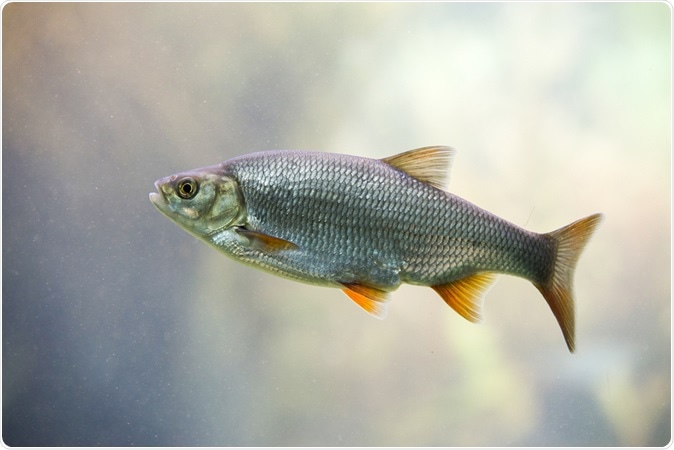According to lead researcher in the field of ecotoxicology, human medicines that end up in the ecosystem are causing mutations in the male fish that mutate them into females. Professor Charles Tyler, fish physiologist and eco-toxicologist from Exeter University, has warned that more and more scientists should work on the exact impact of these drugs and chemicals on nature and marine animals.

Freshwater fish Common Roach. Image Credit: Trybex / Shutterstock
Professor Tyler has been working for over a decade in this field and said that remnants of chemicals and human drugs can cause several “sub-lethal” effects in the fish and other marine animals. These thousands of tonnes of waste substances are a force to reckon with. While some of it are chemicals that come as waste products from the industrial processes, some are drugs that are taken by persons that pass through them and reach the sewers and finally the water.
Professor Tyler will talk about the issue in a lecture titled “Feminisation of Nature – an Unnatural History” at the 50th Anniversary Symposium of the Fisheries Society in the British Isles from July 3rd to 7th. He was part of a large scale study in 2008 that showed that one in four male roach fish taken from 51 different sites on the English rivers were turning into females. They were found to have eggs or ova in their testicles.
The levels of female hormone estrogen were found to be higher in the waters where these fish were found. Estrogen is widely used along with progesterone in birth control pills to stop women from ovulating and prevents unwanted pregnancies. Estrogen is also widely used in other medications used for endocrine disorders or hormonal problems. It is this estrogen that could be feminizing the male fish say experts.
Not just the fish reproductive system, other organs are also affected say researchers. These chemicals interfere with the normal anatomy and physiology or functioning of the fish and its major organs such as kidneys, liver, brain and the heart. According to Professor Tyler, an analysis of the fish liver, reproductive organs or other major organs, gives a clear picture of what chemicals and drugs are being “flushed down the toilet”. Gender change is one of the issues he added. There may be more damage caused by these drugs.
The feminization of the fish has led to poorer breeding and a severe imbalance in the ecosystem. These male fish those are moderate to severely feminized fail to pass on their genes to the next progeny. These feminizing effects thus may not be fatal but may affect the whole fish population as a complete phenomenon the results of which are not clearly understood as of now. With time this could have an impact on the natural systems. Professor Tyler explained that more and more scientists are aware now of the effects of these stresses on wildlife populations. He called for smarted moves and tougher laws to curb this effect. Restrictions or banning these chemicals might be a good step he said in stopping this spread. The evidence that these chemicals are damaging the ecosystems is sufficient and significant he added.